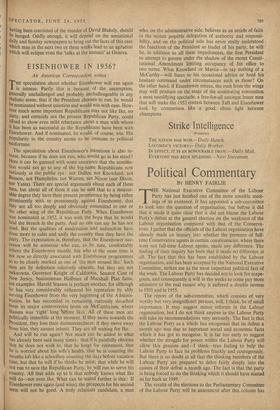EISENHOWER IN 1956?
An American Correspondent writes : THE speculation about whether Eisenhower will run again is intense. Partly this is because of the assumption, generally unchallenged and probably unchallengeable in any realistic sense, that if the President chooses to run, he would be nominated without question and would win with ease. How- ever much some important Republicans may not like Ike, no Party, and certainly not the present Republican Party, could afford to show even mild reluctance about a man with whom it,has been as successful as the Republicans have been with Eisenhower. And if nominated, he would, of course, win. His Popularity in the country seems to be immune to political misfortune.
The speculation about Eisenhower's intentions is also in- tense, because if he does not run, who would go in his stead? Here it can be guessed with some assurance that the nomina- tion would not go to any of the big-name Republicans now variously in the public eye : not Dulles. not Knowland. not Benson, not Humphries, not Warren, not Nixon (nor Dixon, nor Yates). There are special arguments about each of these Men, but about all of them it can be said that to a measur- able degree they have their present prominence by being either Prominently with or prominently against Eisenhower, that they are all too deeply and obviously committed to one or the other wing of the Republican Party. When Eisenhower Was nominated in 1952, it was with the hope that he would heal the breach in the party. And no one can say he has not tried. But the qualities of moderation and indirection have (lone more to calm and unify the country than they have the Party. The expectation is, therefore, that the Eisenhower suc- cessor will be someone who call, to be sure, comfortably inherit the Eisenhower mantle. but who at the same time is not now so directly assoCiated with Eisenhower programmes as to be clearly marked as one of 'the men around lke.' Such Men are by definition relatively obscure, but they are not unknowns. Governor Knight of California, Senator Case of New Jersey, businessman Hoffman of Marshall Plan fame. are examples. Harold Stassen is perhaps another, for although he has very considerably enhanced his reputation by ably serving Eisenhower from the very beginning of the Adminis- tration, he has succeeded in remaining curiously detached from its major controversies (even on McCarthyism, where Stassen was 'right' long 'More Ike). All of these men are Politically immobile at the moment. If they move towards the President, they lose their disinterestedness; if they move away from him, they cannot inherit. They are all waiting for Ike.
And will he run again? Not much can be added to what has already been said many times : that it is painfully obvious that he does not wish to. that he longs for retirement, that he is worried about his wife's health, that he is counting the months left like a schoolboy counting the days before vacation time but that he will if he thinks he must; that while he will not run to save the Republican Party. he will run to serve his country. All that adds up to is that nobody knows what Ike Will do—not even Ike. What can be stated further is this : If Eisenhower runs again (and wins), the prospects for his second term will not be good. A truly reluctant candidate, a man who, on the administrative side, believes as an article of faith in the widest po§sible delegation of authority and responsi- bility, and on the political side has never really understood the functions of the President as leader of his party, he will be, in addition to all these impediments, the first President to attempt to govern under the shadow of the recent Consti- tutional . Amendment limiting occupancy of his office to two terms. What ICnowland or Martin—to say nothing of a McCarthy—will listen to his occasional advice or heed his hesitant command under circumstances such as those? On the other hand, if Eisenhower retires, the rush from the wings may well produce on the stage of the nominating convention a most unedifying spectacle, a free-for-all amongst lesser men that will make the 1952 contest between Taft and Eisenhower look by comparison like a good, clean fight between champions.

















































 Previous page
Previous page